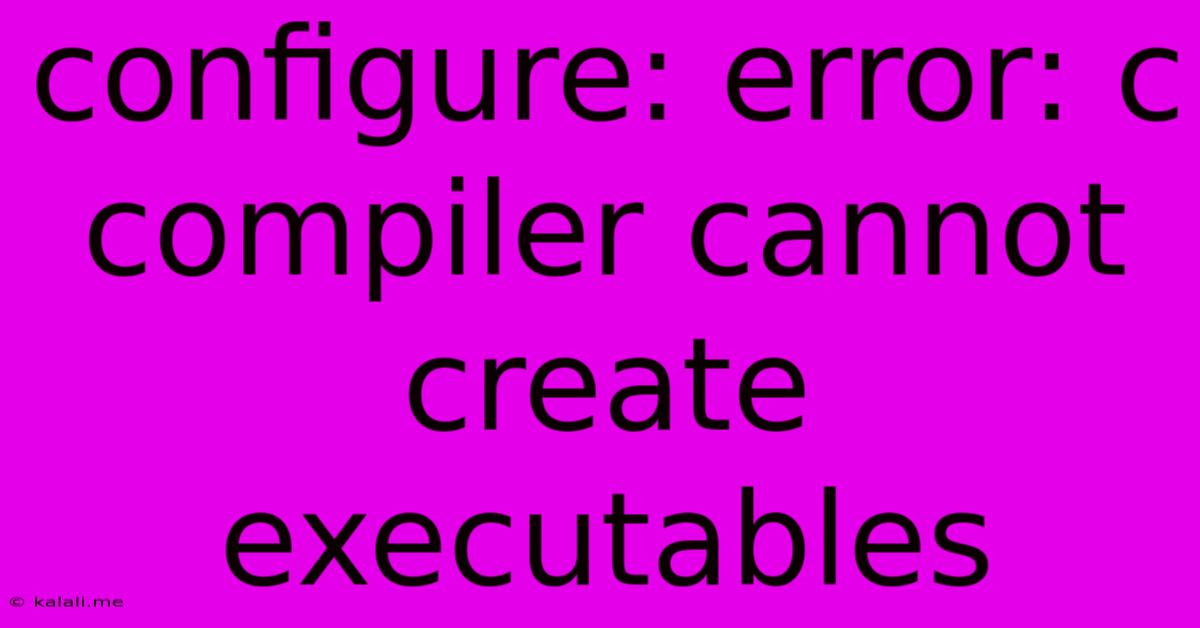Configure: Error: C Compiler Cannot Create Executables
Kalali
May 23, 2025 · 4 min read

Table of Contents
Configure: error: C compiler cannot create executables: Troubleshooting and Solutions
This frustrating error, "configure: error: C compiler cannot create executables," often pops up during the installation or build process of software packages, especially those written in C or C++. It signifies that your system's build system (typically autoconf or a similar tool) can't find a working C compiler or, even if it's found, it can't successfully compile and link a simple test program. This comprehensive guide will explore the common causes and provide effective solutions to resolve this issue.
Understanding the Error
The error message directly indicates that the configuration script (usually configure) used by the software package can't create a basic executable file. This means there's a problem with either your C compiler, its installation, or your system's environment settings. The inability to compile a simple test program implies a fundamental issue preventing successful compilation and linking of more complex software projects.
Common Causes and Solutions
Let's delve into the most frequent causes of this error and explore how to fix them:
1. C Compiler Not Installed or Incorrectly Installed
- Problem: The most obvious reason is the absence of a suitable C compiler like GCC (GNU Compiler Collection) or Clang. Sometimes, even if installed, the compiler might not be correctly configured or accessible through your system's PATH environment variable.
- Solution:
- Install a C Compiler: If you haven't already, install a C compiler. The exact method depends on your operating system:
- Debian/Ubuntu (and similar):
sudo apt update && sudo apt install build-essential - Fedora/RHEL/CentOS:
sudo dnf install gccorsudo yum install gcc - macOS (using Homebrew):
brew install gcc - Windows (using MinGW or Cygwin): Download and install a suitable distribution, ensuring the C compiler is included.
- Debian/Ubuntu (and similar):
- Verify Installation: After installation, open a terminal and type
gcc --versionorcc --version. A successful output displays the compiler version, confirming its successful installation. - Path Environment Variable: Ensure the compiler's bin directory is added to your system's PATH environment variable. This allows the system to find the compiler executable. The exact method for modifying PATH varies depending on your operating system.
- Install a C Compiler: If you haven't already, install a C compiler. The exact method depends on your operating system:
2. Incorrect Environment Variables
- Problem: Even if the compiler is installed, environment variables crucial for compilation might be missing or incorrectly set. Variables like
CCandCXX(for C++ compilers) specify the compiler to use. - Solution:
- Check Environment Variables: Print your current environment variables using
printenv(orenvon some systems) to see ifCCorCXXare set and point to a valid compiler. - Set Environment Variables: If they are missing or incorrect, set them appropriately. For example, if GCC is installed, you might use:
export CC=gccexport CXX=g++
- Temporary Setting (for current session): These changes are only temporary for the current terminal session. To make them permanent, you'll need to add these lines to your shell's configuration file (e.g.,
.bashrc,.zshrc).
- Check Environment Variables: Print your current environment variables using
3. Conflicting Compiler Versions or Installations
- Problem: Multiple C compiler versions or installations can lead to conflicts, particularly if their bin directories clash with the system's PATH.
- Solution:
- Identify Conflicting Installations: Use your system's package manager or search your file system to find multiple compiler installations.
- Remove Conflicting Versions: Remove any unnecessary or conflicting compiler installations to ensure only one is actively used. Prioritize using the compiler installed via your system's package manager.
4. Permission Issues
- Problem: Insufficient permissions to write to directories required for compilation.
- Solution: Ensure you have the necessary write permissions in the directories where the compiler attempts to create temporary files and the final executable. Using
sudomight resolve this issue, but it's crucial to understand the security implications before doing so.
5. Broken Build System
- Problem: In rare cases, the build system itself might be corrupted or improperly configured.
- Solution:
- Reinstall the Software Package: Try reinstalling the software package you're attempting to build. A clean reinstall might resolve issues within the build system's files.
- Examine the Build System's Output: Carefully examine the complete error output from the
configurescript. This might offer more detailed clues about the underlying problem.
By systematically checking these points, you can effectively diagnose and resolve the "configure: error: C compiler cannot create executables" problem. Remember to always back up your data before making significant system changes. If you continue to experience issues, providing the complete error message and the operating system you're using will aid in getting more specific assistance.
Latest Posts
Latest Posts
-
How Many Inches Is Half A Yard
Jul 03, 2025
-
How Old Are You If Your Born In 1996
Jul 03, 2025
-
How Many Water Bottles In 64 Ounces
Jul 03, 2025
-
How Many Cups Is 16 Oz Of Peanut Butter
Jul 03, 2025
-
How Long Is Mayonnaise Good For After Expiration Date
Jul 03, 2025
Related Post
Thank you for visiting our website which covers about Configure: Error: C Compiler Cannot Create Executables . We hope the information provided has been useful to you. Feel free to contact us if you have any questions or need further assistance. See you next time and don't miss to bookmark.